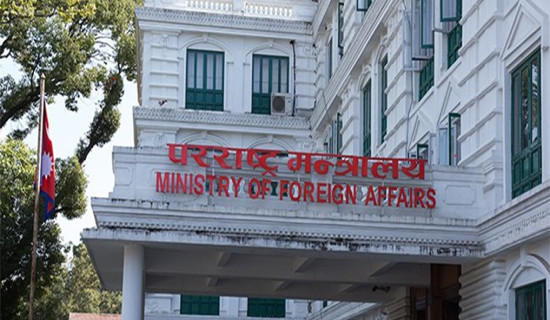- Wednesday, 4 March 2026
Urgency Of Rebuilding Public Trust
Nepal held the general election two years back, the second in the federal context since the promulgation of the new constitution in 2015. It was indeed a huge democratic exercise. Based on the election results, the political parties are building and changing alliances for the government and running the state affairs. Interestingly, most of the political parties have already launched 'mission-84'. It indicates whether they trusted well the 2079 elections.
Similarly, when it was time to appoint the Vice Chancellor of the country's oldest academy, the Tribhuvan University (TU), there was a hue and cry over the selection of a qualified person to head the university. In the wake of the exodus of students of higher education, causing a huge capital flight and denting national economy, debates spurred with expert opinions and interviews made in media on the trust in TU. The government had to re-advertise for the appointment. However, the honcho was finally picked from among the TU professors.
For some years, the new-fangled ones, calling themselves the new political parties in Nepal, are decrying the old ones, questioning their activities. Importantly, as I'm writing this article, a news story pops up on the screen which featured the General Secretary of the Rastriya Swatantra Party wearing a mask adding a black cross on it to sheer objection to party leadership and suppression to his views. He had opened firing at the leadership, showing an urgency of 'surgery' in the party if it needs existing. Now, isn't it an indication the new-fangled ones are also losing trust?
AI taking toll
Moreover, the digitalisation has spurred mis/disinformation; and new media have spurt, shadowing the traditional media. Lately, the artificial intelligence (AI) is taking a toll, especially on information ecosystem where there is a drastic change in collection, curation, gate-keeping, storage, dissemination and consumption of information. It has a direct impact on news production and journalism profession. With this in the context, legacy media are witnessing a tough time to retain trust. The civil society is also blamed that it is divided. Its watchdog role is waning. These are some areas that desperately need trust. If the sectors ranging from media to academia, and from judiciary to political parties, face a short supply of trust, how can the system deliver well? How can the new system be nurtured and prosperity realized in our time?
Federalism is not only an epoch-making change but also a golden opportunity for us to build public trust, because it is the system that is largely expected to reach people's doorsteps and address their needs and aspirations. There are 753 local levels, which are the closest governments to the people. But, the stories of corruption in the very foundation, are blatant blight and rust to the system. Bad governance is severely denting public trust. System building is a shared responsibility. It is not possible with the lone efforts of political parties nor of the judiciary. The togetherness of entire State apparatuses that make laws, and policies; implement them; and continue oversight role is crucial. For this to happen, trust must be accorded a top priority.
How can media and political parties build and retain trust? Strict adherence to code and professionalism along with a watchdog role can build and retain trust in media. Unhealthy competition and unethical race for digital visibility have ruined them. Even the news media consumers have been obfuscated and seem unable to differentiate between a piece of information and a news story. It has badly impacted the decision-making capacity of citizens, which is linked to their trust in media. Media must bolster trust and truth. Time has come for the information integrity as underlined by the United Nation's General Secretary Antonio Guterres. Lunching a document, 'Global Principles for Information Integrity', the world leader, recently, underlined, "At a time when billions of people are exposed to false narratives, distortions and lies, these principles lay out a clear path forward, firmly rooted in human rights, including the rights to freedom of expression and opinion."
Public trust
Similarly, political parties and leaders' strict adherence to political ideology and its reflection in behaviour counts a lot to build public trust. Irrespective of the votes they gain in elections, they quickly lose public trust once their behaviours go wayward. The political leaders' perception towards the system and public institutions must be clear. The leaders should be wary whether their views are running roughshod to the spirit of historic change. Building public trust in a system largely hinges on political behaviour. Are our politicos aware of it?
The academia, on the other hand, is another powerful arena that not only explores ideas and lab-test the logics and scientific elements but also plays a pivotal role in launching innovation and brings a sweeping changes and movements in any country. The academic freedoms are the essence of university that help in earning people's trust. Once toxic politics is foisted in academia and partisan interests are served, the trust in university reaches a nadir. Nepal is also in need of rebuilding public trust in the university so that capable human resources will be created and seminal researches done to make awake the country and people. Universities are in need of becoming centres of excellence. Are our universities up to the mark to this end or slow off the mark?
(Ghimire is associated with National News Agency RSS)
















